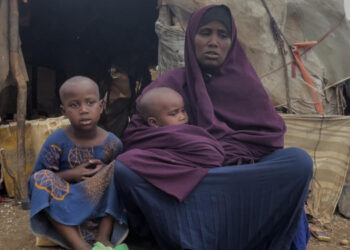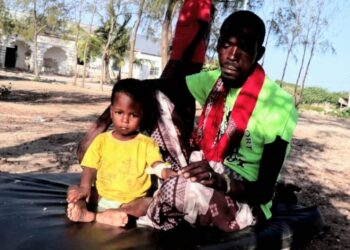(ERGO) – Kulamo Abdi Dheer and her family of 11 people arrived in Ifo 2 camp in Kenya’s Dadaab refugee camp complex on the first day of September – one day after the recent refugee registration process ended.
They fled from southern Somalia’s Bardera in Gedo to Buale in Middle Juba after the drought wiped out their 200 goats over the last three years, and finally travelled nine days across the border to Kenya hoping to receive assistance.
“We used a donkey we borrowed. The young children were riding on the cart. We walked from Liboi to Hagadhera facing food shortage and suffering,” she said.
However, Kulamo’s family is struggling to get one meal a day begging from other refugees every morning and have to walk very far to fetch just 40 litres of water.
“We don’t have water, fodder, toilets or even houses here, that is how we are living. We get a kilo of rice and that’s how we get by. There is no aid organisation that has given us even a can of rice,” Kulamo told Radio Ergo’s local reporter.
The recent process registered 45,000 Somali refugees in Dadaab who had been waiting up to five years for official status.
But Kulamo’s family has no ration cards to access the 6kgs of rice, 2kgs of beans, cooking oil and $5 cash they could otherwise be eligible for each household member. Her husband has been sick with stomach pain for a year and has not been treated in hospital.
Whilst in Buale, Kulamo heard that the refugees in Dadaab were better off so they decided to trek to Kenya. Still, even though conditions are bad, she says she cannot return to Somalia.
“We have lost all our livestock, what do we go back to? I will stay here as long we get flour and water among other things from our brothers,” she declared.
According to Mohamed Abdi Olow, the camp chairman, 22,000 new refugees have joined Ifo camp. Most are from Jubbaland state which is among the worst drought-hit areas in Somalia.
Hamse Abass Abdiwahab and his family of 10 joined the refugee camp on 27 September. With no nutritious food, Hamse’s one year old daughter is given drops of tea as she cannot eat solids.
According to Radio Ergo’s correspondent, who visited them in their small shelter, the baby looked acutely malnourished.
“Her situation is very bad, we don’t have milk to give her, we try to give her some tea that we beg from other families. She needs medication. We have just arrived, and we need to get to know the camp so that we can take her to hospital,” said Hamse.
Hamse was displaced from Jamame, Lower Juba, where he owned three hectares of farmland that yielded nothing due to failed rainy seasons.
The camp chairman said most new refugees were vulnerable children, women and the elderly.
“If they are not registered in the next few weeks, I think there will be some people dying, because the families in the camp cannot continue to support the new refugees. There is huge pressure on the people,” he said.











